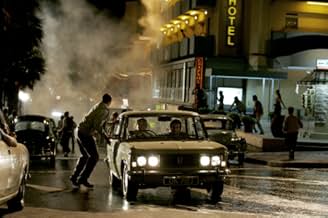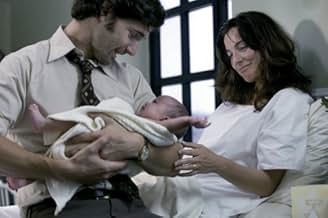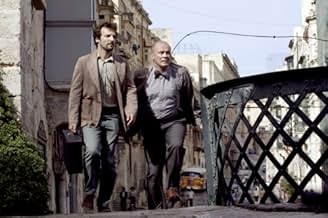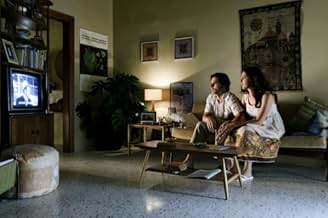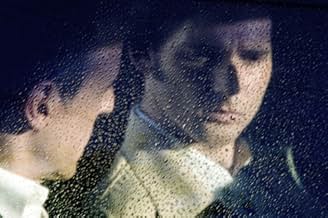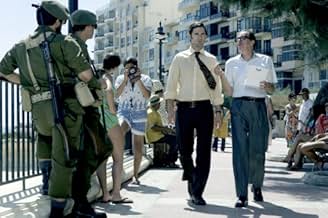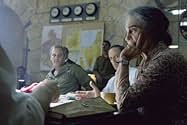Basada en los acontecimientos reales de Septiembre Negro, sobre los 5 hombres escogidos para eliminar a los responsables de aquel fatídico día.Basada en los acontecimientos reales de Septiembre Negro, sobre los 5 hombres escogidos para eliminar a los responsables de aquel fatídico día.Basada en los acontecimientos reales de Septiembre Negro, sobre los 5 hombres escogidos para eliminar a los responsables de aquel fatídico día.
- Dirección
- Guionistas
- Elenco
- Nominado a 5 premios Óscar
- 14 premios ganados y 75 nominaciones en total
Marie-Josée Croze
- Jeanette the Dutch Assassin
- (as Marie-Josee Croze)
Valeria Bruni Tedeschi
- Sylvie
- (as Valéria Bruni Tedeschi)
Amos Lavi
- General Yariv
- (as Amos Lavie)
- Dirección
- Guionistas
- Todo el elenco y el equipo
- Producción, taquilla y más en IMDbPro
Opiniones destacadas
Gandhi said, "An eye for an eye only makes the whole world blind." What distinguishes justice from vengeance? This echoes throughout Steven Spielberg's "Munich". "Munich" is powerful and perhaps Spielberg's most compelling and thought provoking work. He weaves a tapestry of political and social threads focusing on terrorism and the cost of violence. "Munich" is truly amazing in balancing linear storytelling and horrific acts of violence, demonstrating the impact of the aftermath. Spielberg's "Munich" seen through the eyes of Eric Bana's Avner is a powerful allegory that even in the most just and noble fights against terror we eventually become that which we despise. "Munich" really serves as a reminder. Mossad team leader Avner played by Eric Bana is absolutely riveting as the man who begins this righteous cause only to find that the cost is his soul. Anver asks, "When does it ever end?"
At the 1972 Olympic Games in Munich, Palestinian terrorists brutally murdered the Israeli wrestling team. This political statement was seen around the world and depicted in gory detail by Director Spielberg. Based on the book "Vengeance" by George Jones, the screenplay by Tony Kushner and Eric Roth tells the story of the aftermath of this tragedy. A great Lynn Cohen who plays Prime Minister Golda Meir says, "Every civilization finds it necessary to negotiate compromises with its own values." Poetic words for what follows are a search and destroy mission. The Mossad assembles a team lead by Avner (Bana) to track down and kill with extreme prejudice all those involved in the terrorist action in Munich. 11 names are identified for execution. These executions are also intended to serve as statements. Anver though an inexperienced operative and not an assassin is selected for the covert mission by Ephriam (the great Geoffrey Rush) for being a strong and effective leader of men. The assassin team is composed of Steve (Daniel Craigthe next James Bond), Carl (Ciaran Hinds), Robert (Mathieu Kassovitz), and Hans (Hanns Zischler). They are dissociated from the Mossad, i.e. they technically don't exist.
In accepting the lead, Avner must leave his beautiful and pregnant wife Daphna (a very strong Ayelet Zorer) for what could be a number of years. Carl has his doubts about Avner, telling him that he was chosen because he is a "good soldier". Soon Carl respects Avner for his quiet force and conscience. Attack of conscience and paranoia soon engulf the team as they become entrenched in the world of underground intelligence for hire. Avner pays large sums of money for information on the whereabouts of his targets from Louis (wonderfully shady Mathiew Amalric) and his wealthy Papa (weary and noble Michael Lonsdale). Avner soon finds that whomever he kills is eventually replaced, and that he and potentially his family is now a target for the terrorists he was assigned to hunt down and kill. The realization is that it truly never ends. Bana is amazing as a trapped animal in the scene in his thrashed apartmentsearching for weapons of his demise. Paranoia sets in, and the path of justice and vengeance become blurred. In a poignant scene Robert pleads to Avner, "When I lose my righteousness, I lose everything "
Nothing about "Munich" is easy, though it is simple. I believe that is Steven Spielberg's intention. "Munich" could be tighter in spots, though this does not diminish the movie's power and impact. Eric Bana emerges as the noble hero battling to salvage his own humanity and his very soul. "When does it ever end?" Perhaps even in the current context there is no real answermaybe what Spielberg is getting at. It is a reminder of our humanity, that even the most righteous cause may cost our souls. "Munich" is truly a powerful movie worth seeing.
At the 1972 Olympic Games in Munich, Palestinian terrorists brutally murdered the Israeli wrestling team. This political statement was seen around the world and depicted in gory detail by Director Spielberg. Based on the book "Vengeance" by George Jones, the screenplay by Tony Kushner and Eric Roth tells the story of the aftermath of this tragedy. A great Lynn Cohen who plays Prime Minister Golda Meir says, "Every civilization finds it necessary to negotiate compromises with its own values." Poetic words for what follows are a search and destroy mission. The Mossad assembles a team lead by Avner (Bana) to track down and kill with extreme prejudice all those involved in the terrorist action in Munich. 11 names are identified for execution. These executions are also intended to serve as statements. Anver though an inexperienced operative and not an assassin is selected for the covert mission by Ephriam (the great Geoffrey Rush) for being a strong and effective leader of men. The assassin team is composed of Steve (Daniel Craigthe next James Bond), Carl (Ciaran Hinds), Robert (Mathieu Kassovitz), and Hans (Hanns Zischler). They are dissociated from the Mossad, i.e. they technically don't exist.
In accepting the lead, Avner must leave his beautiful and pregnant wife Daphna (a very strong Ayelet Zorer) for what could be a number of years. Carl has his doubts about Avner, telling him that he was chosen because he is a "good soldier". Soon Carl respects Avner for his quiet force and conscience. Attack of conscience and paranoia soon engulf the team as they become entrenched in the world of underground intelligence for hire. Avner pays large sums of money for information on the whereabouts of his targets from Louis (wonderfully shady Mathiew Amalric) and his wealthy Papa (weary and noble Michael Lonsdale). Avner soon finds that whomever he kills is eventually replaced, and that he and potentially his family is now a target for the terrorists he was assigned to hunt down and kill. The realization is that it truly never ends. Bana is amazing as a trapped animal in the scene in his thrashed apartmentsearching for weapons of his demise. Paranoia sets in, and the path of justice and vengeance become blurred. In a poignant scene Robert pleads to Avner, "When I lose my righteousness, I lose everything "
Nothing about "Munich" is easy, though it is simple. I believe that is Steven Spielberg's intention. "Munich" could be tighter in spots, though this does not diminish the movie's power and impact. Eric Bana emerges as the noble hero battling to salvage his own humanity and his very soul. "When does it ever end?" Perhaps even in the current context there is no real answermaybe what Spielberg is getting at. It is a reminder of our humanity, that even the most righteous cause may cost our souls. "Munich" is truly a powerful movie worth seeing.
This movie relates more than just a story of "Vengeance". Besides proving that killing begets killing - it consists of numerous fine details that reveal the hard work done at getting to the depth of things:
For instance, only characters that get shot in the head slump to the ground. The rest take time to die - they walk a few steps, spurt blood and express a look of helplessness and inevitability before going out. Yes its horrifying to look at, which is the point, but it is also real.
Every character is different, and though common in their desire for vengeance, their temperaments are clearly distinguishable in the way the hit men approach their task. Even the terrorists are not stereotyped into hysterical, screaming lunatics. They range from the visibly nervous to the cool Abu Salameh with the movie star style. They are poets, intellectuals and guerrillas each with his story of the conflict. They speak passionately about home - a recurring theme, along with "family". Moreover, Spielberg does not attempt to mitigate the grotesque manner of their deaths, for the blood of the targeted men flows as freely as that of their victims - and when they are blown up, their body parts dangle from ceiling fans. You are not here to feel satisfaction over anyone's death, Spielberg says to the audience. Or as Caine would say in Kung Fu: "The taking of a life does no one honour."
There are no easy "shoot-em-dead" eliminations. There are neighbors, bystanders and obstacles that must be avoided and protected - with variable success. Innocent people may be harmed - and one has to live with that.
There are no mathematical certainties about the potential damage a bomb will cause.
Perspectives and convictions can change, sometimes regrettably. "Don't think about it - just do it" says Avner at one stage when a member of the team expresses doubts about a target's guilt. But at the end he wants evidence that the men he despatched were justifiably killed. Implausible? No; it is only when he has been reunited with his family and experiences the affection of wife and child that he allows himself to reflect from a different perspective - their targets had families too - what if he had killed the wrong men?
The paranoia that permeates the world of spies and assassins is built up gradually - to the point where every survivor mistrusts everybody else. One is doomed all one's life to walk with ears strained for following footsteps. The length of the movie creates the right atmosphere for this idea.
The end dissatisfies many because they would like a reassurance, a note of optimistic finality - but Spielberg rightly offers none. It would be dishonest of him to offer a false but comforting illusion.
It is interesting to contrast this movie with "Paradise Now" that has no violence, a modest budget, and views the conflict from the Palestinian camp. Both narrate completely different stories - yet, in their respective ways, both humanize their subjects, defuse myths about glory, and arrive at the same conclusion: "There's no peace at the end of this."
For instance, only characters that get shot in the head slump to the ground. The rest take time to die - they walk a few steps, spurt blood and express a look of helplessness and inevitability before going out. Yes its horrifying to look at, which is the point, but it is also real.
Every character is different, and though common in their desire for vengeance, their temperaments are clearly distinguishable in the way the hit men approach their task. Even the terrorists are not stereotyped into hysterical, screaming lunatics. They range from the visibly nervous to the cool Abu Salameh with the movie star style. They are poets, intellectuals and guerrillas each with his story of the conflict. They speak passionately about home - a recurring theme, along with "family". Moreover, Spielberg does not attempt to mitigate the grotesque manner of their deaths, for the blood of the targeted men flows as freely as that of their victims - and when they are blown up, their body parts dangle from ceiling fans. You are not here to feel satisfaction over anyone's death, Spielberg says to the audience. Or as Caine would say in Kung Fu: "The taking of a life does no one honour."
There are no easy "shoot-em-dead" eliminations. There are neighbors, bystanders and obstacles that must be avoided and protected - with variable success. Innocent people may be harmed - and one has to live with that.
There are no mathematical certainties about the potential damage a bomb will cause.
Perspectives and convictions can change, sometimes regrettably. "Don't think about it - just do it" says Avner at one stage when a member of the team expresses doubts about a target's guilt. But at the end he wants evidence that the men he despatched were justifiably killed. Implausible? No; it is only when he has been reunited with his family and experiences the affection of wife and child that he allows himself to reflect from a different perspective - their targets had families too - what if he had killed the wrong men?
The paranoia that permeates the world of spies and assassins is built up gradually - to the point where every survivor mistrusts everybody else. One is doomed all one's life to walk with ears strained for following footsteps. The length of the movie creates the right atmosphere for this idea.
The end dissatisfies many because they would like a reassurance, a note of optimistic finality - but Spielberg rightly offers none. It would be dishonest of him to offer a false but comforting illusion.
It is interesting to contrast this movie with "Paradise Now" that has no violence, a modest budget, and views the conflict from the Palestinian camp. Both narrate completely different stories - yet, in their respective ways, both humanize their subjects, defuse myths about glory, and arrive at the same conclusion: "There's no peace at the end of this."
Another dip in the Spielberg pool and I come away drenched in emotion. I was a freshman in high school in Texas during the Munich games. I was stunned by the events and understood little.
Today, I am still stunned by Munich and every terrorist act that followed, but I understand so much more and grieve. Spielberg gives us a powerful glimpse into the meaning of home, family, honor, history, ethics, and faith. The movie is not about the Jews and Arabs. It's about human beings. It's about us.
The narrative is driven by our connection to Avner. We watch as Eric Bana opens himself up in a way that the likes of a George Clooney in Syriana only dreams of.
This is a must see.
Today, I am still stunned by Munich and every terrorist act that followed, but I understand so much more and grieve. Spielberg gives us a powerful glimpse into the meaning of home, family, honor, history, ethics, and faith. The movie is not about the Jews and Arabs. It's about human beings. It's about us.
The narrative is driven by our connection to Avner. We watch as Eric Bana opens himself up in a way that the likes of a George Clooney in Syriana only dreams of.
This is a must see.
Munich may just be Spielberg's greatest accomplishment ever and it isn't a sweeping epic like you'd expect, but a patient psychological thriller that sneaks up on you and takes you and shakes you. It not shy away from blood, politics or nudity in its portrayal of events and this makes it extremely intense, absorbing and occasionally very violent.
The first half of Münich is not altogether different from a heist drama; a group of diverse men with different skills team up to accomplish a mission. They get to travel across Europe, make deals, infiltrate suspect facilities and manufacture explosive devices. Unlike heist films, however, their mission is not for personal gain, but for the government. They are to assassinate eleven Arabs who were alleged to be behind terrorist attacks like Münich 1972. So the more accessible part of the film sees Bana and his men botch their way through a hit-list as inexperienced hit-men, fumbling and trembling with the weight of this somber new task.
This part is so extraordinarily well-handled and engaging with a tone so tense and shadowed by politics and ethical dilemmas that every slight pause is mistaken for humour. It is also an excellent portrayal of an era - the 1970s - with great eye for detail, all carefully sewn together by a master tailor (Spielberg). It is a fantastic piece of film-making.
While Munich keeps you interested throughout, it gradually loses its fresh thriller edge by opting for more typical scenarios. Eric Bana's character goes through emotional struggles because he finds it too hard to kill people. He thinks about his family--his wife has just had a baby girl. He wonders if he is doing the right thing. He starts sympathizing with the Arabs. He wonders if they killings will stop once he has completed his mission. Everything is classic and you saw it coming. It needs to be present in the film for a balanced portrayal but the hackneyed formula with which it is expressed is disappointing. It started so promising, after all.
Sadly, the culmination of this slightly hackneyed recipe manifests itself in the final scene of the film and it is absolutely dreadful and drags the whole film down by at least one star - but overall this is superb quality that is carried by a strong ensemble cast (Geoffrey Rush, Daniel Craig) although it is ultimately Bana's show. He captures the inner turmoil and hesitation of his character in the most believable way, making Munich into a worthwhile adventure for its performances alone. But most importantly, it dares to asks questions.
8/10
The first half of Münich is not altogether different from a heist drama; a group of diverse men with different skills team up to accomplish a mission. They get to travel across Europe, make deals, infiltrate suspect facilities and manufacture explosive devices. Unlike heist films, however, their mission is not for personal gain, but for the government. They are to assassinate eleven Arabs who were alleged to be behind terrorist attacks like Münich 1972. So the more accessible part of the film sees Bana and his men botch their way through a hit-list as inexperienced hit-men, fumbling and trembling with the weight of this somber new task.
This part is so extraordinarily well-handled and engaging with a tone so tense and shadowed by politics and ethical dilemmas that every slight pause is mistaken for humour. It is also an excellent portrayal of an era - the 1970s - with great eye for detail, all carefully sewn together by a master tailor (Spielberg). It is a fantastic piece of film-making.
While Munich keeps you interested throughout, it gradually loses its fresh thriller edge by opting for more typical scenarios. Eric Bana's character goes through emotional struggles because he finds it too hard to kill people. He thinks about his family--his wife has just had a baby girl. He wonders if he is doing the right thing. He starts sympathizing with the Arabs. He wonders if they killings will stop once he has completed his mission. Everything is classic and you saw it coming. It needs to be present in the film for a balanced portrayal but the hackneyed formula with which it is expressed is disappointing. It started so promising, after all.
Sadly, the culmination of this slightly hackneyed recipe manifests itself in the final scene of the film and it is absolutely dreadful and drags the whole film down by at least one star - but overall this is superb quality that is carried by a strong ensemble cast (Geoffrey Rush, Daniel Craig) although it is ultimately Bana's show. He captures the inner turmoil and hesitation of his character in the most believable way, making Munich into a worthwhile adventure for its performances alone. But most importantly, it dares to asks questions.
8/10
'Munich' is, on the whole, a straight forward hit-man movie. The assignments are handed out; the team is assembled, each with their own specialty; and they travel about Europe plotting and carrying out their hits. We have the inevitable paranoia, the double agents and suspicious loyalties. So far, so familiar. Only 'Munich' is wrapped in the thin veneer of 'history' and 'fact', and mob bosses and corporate espionage is replaced with Middle Eastern politics and Israeli-Arab relations. I mention this because the politics of 'Munich' are really nothing more than a topical plot devise, used the same way as cold-war relations and soviet villainy was used thirty years ago.
What prevents 'Munich' becoming just a generic updated-cold-war thriller, is the sheer quality of the production. From the flawless recreation of European capitals in the early seventies to the impeccable costume design to the beautiful cinematography 'Munich' is a visually fascinating movie. The performances are universally outstanding, with Bana in particular bringing a sense of tough nobility that seems to be his forte. The script is intelligent and thought-provoking, and it is Kushner's focus on the emotional and psychological landscape of his characters rather than the details of political contract killing, that ultimately lifts the movie above the generic. The kind of self-consciously poetic prose for which he is known, so often seeming unrealistically erudite, is kept to a minimum, and when it does appear, is so beautifully written and performed that all reservations are forgotten.
Ultimately, the greatest praise must be reserved for Spielberg, who has, with 'Munich', created perhaps the first truly adult movie of his career. We see no signs of his trademark sentimentality, his descents into fantasy, his childish simplification of motivation. With 'Munich', he embraces ambiguity and complexity, and as a result, has invited criticism from those who prefer their drama simplistically black and white. Above all, one can't help but wonder what the Spielberg oeuvre would look had he not dedicated his career to kid's movies, fantasies and feel-good sci-fi.
'Munich' is an intelligent and gripping thriller that is a major contender for award recognition, and deservedly so. An outstanding achievement.
What prevents 'Munich' becoming just a generic updated-cold-war thriller, is the sheer quality of the production. From the flawless recreation of European capitals in the early seventies to the impeccable costume design to the beautiful cinematography 'Munich' is a visually fascinating movie. The performances are universally outstanding, with Bana in particular bringing a sense of tough nobility that seems to be his forte. The script is intelligent and thought-provoking, and it is Kushner's focus on the emotional and psychological landscape of his characters rather than the details of political contract killing, that ultimately lifts the movie above the generic. The kind of self-consciously poetic prose for which he is known, so often seeming unrealistically erudite, is kept to a minimum, and when it does appear, is so beautifully written and performed that all reservations are forgotten.
Ultimately, the greatest praise must be reserved for Spielberg, who has, with 'Munich', created perhaps the first truly adult movie of his career. We see no signs of his trademark sentimentality, his descents into fantasy, his childish simplification of motivation. With 'Munich', he embraces ambiguity and complexity, and as a result, has invited criticism from those who prefer their drama simplistically black and white. Above all, one can't help but wonder what the Spielberg oeuvre would look had he not dedicated his career to kid's movies, fantasies and feel-good sci-fi.
'Munich' is an intelligent and gripping thriller that is a major contender for award recognition, and deservedly so. An outstanding achievement.
¿Sabías que…?
- TriviaGuri Weinberg played his own father. He is the son of Moshe Weinberg, the Israeli wrestling referee and former champion, who died in the massacre when Guri was just one month old.
- ErroresThough they took the time to digitally add the World Trade Center to the final shot, they didn't edit out the Citigroup Center, Trump World Tower, and the Bloomberg building, which were built after the time of the movie.
- Versiones alternativasThe film was heavily censored in Malaysia for a 'U' rating. The uncut version is rated '18PL'.
- ConexionesFeatured in Today: Episode dated 27 July 2005 (2005)
- Bandas sonorasAin't No Sunshine
Written & Performed by Bill Withers
Courtesy of Columbia Reecords
By Arrangement with Sony BMG Music Entertainment
Selecciones populares
Inicia sesión para calificar y agrega a la lista de videos para obtener recomendaciones personalizadas
Detalles
- Fecha de lanzamiento
- Países de origen
- Idiomas
- También se conoce como
- Untitled 1972 Munich Olympics Project
- Locaciones de filmación
- Bugibba, Malta(Olympic Hotel in Cyprus)
- Productoras
- Ver más créditos de la compañía en IMDbPro
Taquilla
- Presupuesto
- USD 70,000,000 (estimado)
- Total en EE. UU. y Canadá
- USD 47,403,685
- Fin de semana de estreno en EE. UU. y Canadá
- USD 4,152,260
- 25 dic 2005
- Total a nivel mundial
- USD 130,982,407
- Tiempo de ejecución2 horas 44 minutos
- Color
- Mezcla de sonido
- Relación de aspecto
- 2.35 : 1
Contribuir a esta página
Sugiere una edición o agrega el contenido que falta


